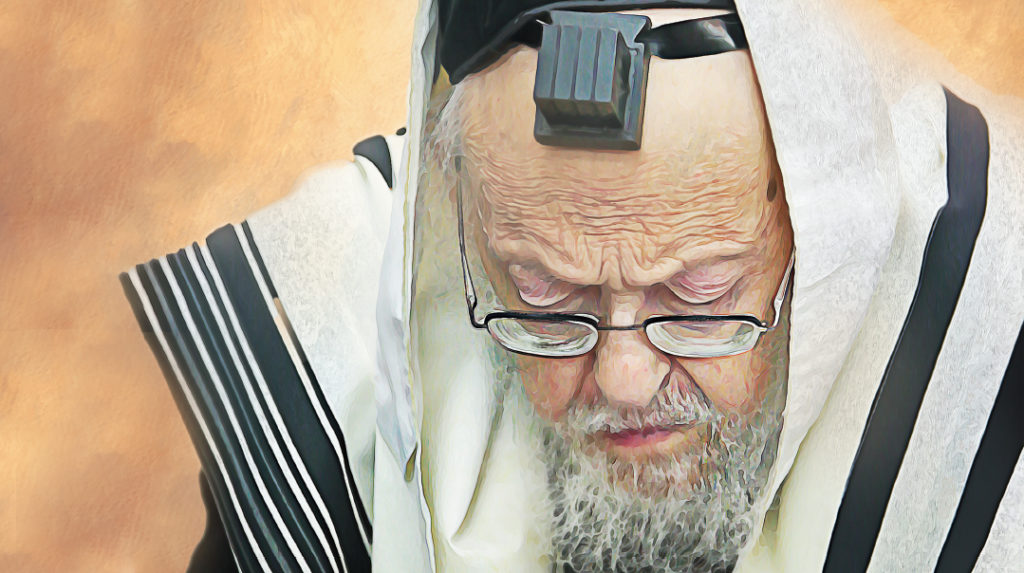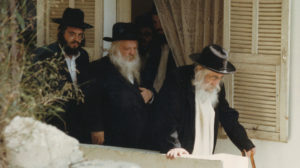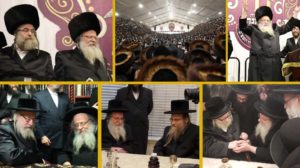Palace of Torah
| July 24, 2019In honor of his seventh yahrtzeit, Rav Elyashiv’s daughter, Rebbetzin Sura Yisraelson, recalls a childhood among giants

On a recent trip to Eretz Yisrael, while my husband was waiting for an audience with Rav Chaim Kanievsky shlita, I went around the corner with my young daughters to meet Rav Chaim’s sister-in-law, Rebbetzin Sura Yisraelson. A granddaughter of Reb Aryeh Levin, a daughter of Rav Elyashiv, wife of Rav Yosef Yisrael Yisraelson, and sister of Rebbetzin Batsheva Kanievsky, Rebbetzin Yisraelson is a scion of greatness.
The Rebbetzin welcomed us into her first-floor abode, a cozy little escape from the traffic of Rechov Chazon Ish below. Her soft features and gentle, almond-eyed gaze carry an uncanny resemblance to her saintly father.
Not only did Rebbetzin Yisraelson grow up in the vicinity of greatness, but her children, too, were surrounded by it. In addition to having a father who was a noted talmid chacham, Rav Steinman ztz’’l lived in the apartment below theirs. “Rav Steinman and his Rebbetzin were like family to us,” she tells me. “I used to knock at their door to borrow eggs.”
On our way up, I’d noticed the metal nameplate, “Steinman” in the center of the simple wooden door.
“Does anyone live there now?” I ask the Rebbetzin.
“No, not yet. My father Rav Elyashiv’s apartment is also still empty, untouched, looking exactly the way it always did.”
“Sh, Tatte lernt”
It must have been a struggle for the Yisraelsons to muffle the footsteps of their 14 children kein ayin hara so as not to disturb their downstairs neighbor, especially on the tiled floor that was the Steinman’s ceiling, but the Rebbetzin describes how tiptoeing around her own childhood home was second nature to her and her siblings, having been imbued from infancy with “Sh, Tatte lernt.”
“Already when we were tiny,” she says, “we knew how great our father was. And we knew that disturbing him from learning was the worst thing we could do. There were many geonim in his time, but his cheshek for Torah was lemalah min derech hateva. It was his food, his drink, his oxygen!”
She quotes her sister, Rebbetzin Auerbach, who would say that disturbing their father from learning was like pulling a baby away from his mother after he’d been crying longingly to be fed.
When Rav Elyashiv became frail and spent more time learning at home, many people came to consult with him; even the saintly Rav Shach once came to discuss something of import. Rebbetzin Elyashiv was distressed by the loss of privacy since she knew how badly Rav Elyashiv wanted to preserve his limited energy for learning and how it upset him to be deprived of that oxygen. She herself was never guilty of peeling his eyes away from his sefer, single-handedly running their home, even in emergencies. The stories her daughter shares are mind-boggling.
“My mother was so moser nefesh for him, I could write a book about it. Let me tell you a story that has been retold in different versions, but I’ll tell you the correct one. My son once visited my mother, and he was shocked to see a huge gash on her forehead. He asked her what happened. She told him that she went to the kitchen in the middle of the night and she fell, but she knew that my father slept every night from eleven till two thirty, after which he commenced his full day of learning, and she didn’t want to wake him during those precious few hours of sleep.
“She was in a lot of pain, she couldn’t even get to her feet, but for two and a half hours she lay there pressing tissues to her head. Finally, when she heard him washing negel vasser, she called out ‘Yosef Shalom, come help me!’ ”
Rebbetzin Elyashiv suffered from lung cancer toward the end of her life and was prone to fits of heavy coughing. “The coughing was very painful for her,” recounts Rebbetzin Yisraelson, “but she’d call out to me, ‘Sura, Sura, close the door, Tatte shouldn’t hear,’ and she would restrain her coughing until the door was closed.”
Then there was the time Rebbetzin Yisraelson’s younger brother Binyomin (now, esteemed gadol Rav Binyomin Elyashiv shlita) suffered from life-threatening appendicitis. The doctors wanted to operate, but her mother didn’t want to make the decision alone. So the two of them, mother and daughter, walked to Ohel Heichal Sarah Shul, where her father learned, to ask his opinion.
“As we came near,” she describes, the awe still evident over half a century later, “and we heard my father’s voice learning with such geshmak, my mother stopped and said to herself, ‘No, I can’t disturb him, let’s go back.’ Halfway back, anxiety overcame her and she said she had to ask him. It was too big a decision for her.
“She retraced her steps, but again, when she got closer, she stopped in her tracks and turned around, this time declaring for certain that she wouldn’t disturb him. From there, she went to the hospital and authorized the doctors to proceed with the surgery. The next day, after all was done, she calmly told her husband what had ensued.”
Before Rebbetzin Elyashiv was niftar, she told her children, “Es kumt mich gornisht, ober geshtert hob ich nisht — I don’t get any credit, but disturb him I didn’t.”
Quiet but Caring
That’s not to say that their gaon of a father wasn’t present in their lives. He didn’t kiss them and he didn’t spend much time with them, but he cared deeply about them. Rebbetzin Yisraelson recalls how after their mother had a baby, their father lovingly prepared their lunches and made sure they went to school on time. “He was very devoted. Whatever we needed to ask of him, we asked.”
I ask if her brothers felt a pressure to learn or if their father got angry when they didn’t learn. “He never got angry,” she says resolutely. “He said what had to be said, and moved on. And he never put pressure on the children. He believed that every child should learn according to his individual ability.”
Rav Elyashiv had a distinct piercing gaze that we know from the pictures adorning many a home, but apparently it was more than just a feature caught on the camera, says his daughter. “We were scared to look at him, since we knew he could see right through us. Sure enough, he would tell us exactly what we were thinking. He understood the psychology of each child.”
To the outside world, that stern gaze might have made it appear that Rav Elyashiv was beyond emotion, but Rebbetzin Yisraelson dispels that notion. He may have been very quiet, she says, even when he scolded them, but all the feelings were there, controlled, bottled in. “When we came home from school, he would ask us everything about our day, calmly, quietly. If someone was sick, you wouldn’t see his pain, he would keep it inside, but you’d know that it was on his mind because he would keep asking how the child was feeling.”
“What made Rav Elyashiv smile, besides Torah?” I ask.
“Nachas from the children and grandchildren. When they came to visit from yeshivah, he never farhered them or asked them about their learning. Like I said, he didn’t demand achievements from anyone, he just gave them his attention. He would ask them about trivialities, like what they ate in yeshivah that day, so they should feel love, not pressure. Sure, if they’d ask to be farhered or requested help in reviewing their learning, he would comply.”
It’s well-known that Rav Elyashiv’s reserved nature left his young kallah disappointed; she was a lively, fun-loving girl and found little in common with the shtiller bochur at her side. Since when does a chassan go to learn after every sheva brachos? she brooded miserably to her father during the week of sheva brachos.
“He’s a masmid,” her father reassured her. “He will be big one day.”
“She trudged back home,” describes her daughter, her almond-shaped eyes twinkling, “and not only was she moser nefesh for his way of life, but he only became Rav Elyashiv because of her!”
Hard at Work
When Rav Elyashiv came home after a full day of learning, instead of announcing that she could finally use his help, his Rebbetzin would announce that now Tatte needed a rest. “We grew up knowing that my father toiled much harder in learning than he would have looking after us 14 children. You could judge how hard a sugya was by looking at the pile of hairs on the floor at his feet. He would pull at his beard while immersed in learning. The harder the sugya, the thicker the pile!”
One would assume that for someone whose every fiber is Torah, learning was sheer unparalleled pleasure, not hard labor. As if reading my thoughts, she shares a telling story of the Chofetz Chaim who was once shoveling heavy snow when the passersby noticed and came running, “Rebbi, don’t. It’s hard.” The Chofetz Chaim answered, “Hard is a blatt Gemara. This is easy!”
“If I’d have composed birchos hashachar,” she quips, “I’d have written sheloi asani ish, because I saw how hard and how much effort learning took.”
Rav Elyashiv was a weak person, which made his full-time occupation all the more strenuous. His Rebbetzin, who made his wellbeing her number-one priority, would send him to a hotel every year the week before Pesach, so he could learn undisturbed by the scrubbing and scraping in the room next door. She would save up all year for this “vacation,” with not an ounce of resentment that she had to prepare for Pesach on her own.
I ask Rebbetzin Yisraelson to tell me about her childhood. Were they able to have friends over? Did they celebrate birthdays? Could they sweat the small stuff?
“We could have friends over, as long as we didn’t disturb my father’s learning. We’d collect five stones from outside and we’d play kugelach. We didn’t get presents, we knew Tatte sits and learns so we can’t afford luxuries, but we had what we needed. Everything was minimal, even Shabbos food. We had a little, but enough. As for birthdays, we never spoke about them. I didn’t even know when I turned bas mitzvah!”
“Did you ever feel deprived?” I venture.
“No, this was our life, we didn’t know anything else. Halevai I should be a little like my parents. They never had to give us mussar. They were living mussar seforim.”
She sweeps her arm around her modestly furnished dining room. The silver closet is a Lucite shelf nailed randomly to one wall, holding a small candelabra wrapped in a plastic bag. “I live in a palace compared to what I grew up in. Nu, kinderlach,” she asks my children, her frail hand caressing their cheeks, “do you like my palace?”
They scan the room, taking in the bare walls, the threadbare chairs, then look back at her, wondering if the ever-present sparkle in her eyes indicates a tease.
As she escorts us out of the palace, we feel that our pockets have just been stuffed with priceless treasures. We try to freeze the powerful image of the simple dining room in our mind, letting it seep into our hearts and minds — the awareness that Torah is worth more than all the gold and silver in the world.
(Originally featured in Family First, Issue 652)
Oops! We could not locate your form.













